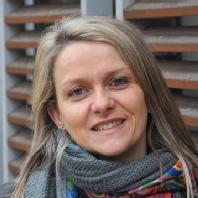Green Optimism - Reflections on COP26

Green Optimism - Reflections on COP26
Tuesday 14 Dec 2021The 26th UN Climate Change Conference of the Parties (COP26) took place on 1-12 November 2021 in Glasgow. World leaders, alongside tens of thousands of negotiators, government representatives, businesses and citizens attended the conference for twelve days of talks. The University of Warwick sent a delegation of 17 to attend the global climate conference and one of the delegates was Dr Lory Barile, Associate Professor in the Department of Economics. Here is what Lory said about her experience of attending the conference.
Green Optimism - Reflections on COP26
by Dr Lory Barile
I was really pleased to join the Warwick delegation at COP26 in week 2 of the conference. Two of the conference themes were of particular interest to me: ‘adaptation, loss and damage’ and ‘gender’. The events I attended under the first theme focused on exploring ways of adapting to climate change impacts and dealing with the loss and damages associated with the climate emergency. The events on ‘gender’ discussed the role of women and girls in implementing climate action.
 Attending COP26 was an interesting and inspiring experience. I felt that there was a greater sense of urgency for action and focus than ever before. I hope this will translate into solutions to fight climate change as science is clear we have no time to lose. The main lesson I took away is that the world needs more ‘green’ optimism. Framing the transition to a more sustainable world in a positive way can really make a difference. COP26 showcased the power of telling positive stories about climate change and the impact this can have on individuals’ behaviour and on local communities. Negative feelings and pessimism can paralyse the world. However, hopefulness and confidence about our future world in the green revolution may be strong incentives for us to become agents of change. The Grand African Green Up Project represents an inspirational example of stories that can help make a difference.
Attending COP26 was an interesting and inspiring experience. I felt that there was a greater sense of urgency for action and focus than ever before. I hope this will translate into solutions to fight climate change as science is clear we have no time to lose. The main lesson I took away is that the world needs more ‘green’ optimism. Framing the transition to a more sustainable world in a positive way can really make a difference. COP26 showcased the power of telling positive stories about climate change and the impact this can have on individuals’ behaviour and on local communities. Negative feelings and pessimism can paralyse the world. However, hopefulness and confidence about our future world in the green revolution may be strong incentives for us to become agents of change. The Grand African Green Up Project represents an inspirational example of stories that can help make a difference.
COP26 also stressed the need to for us to work together: collaboration between governments, businesses and civil society is pivotal to accelerating action. Increasing awareness that behavioural change is part of the action plan is an important aspect of this work. Tackling the problem of climate change is not only an issue for governments, or businesses but it is also important for consumers and the choices they make.
Having funds to develop infrastructure to support the transition to a greener and more sustainable world is an important issue. It is equally important to fund the technology and innovation that we need – there is no doubt about that. However, small actions that people make every day can also make a big difference, especially if we think about scaling them up to the whole population.
Higher education can play a crucial role here. The higher education sector is under increasing pressure to embed education for sustainable development into the curriculum and create globally aware and responsible graduates and citizens. Right now, with an increasing demand for ‘green skills’ by employers, and ‘future-proof skills’ by students, higher education institutions face challenges and opportunities. It will be interesting to see how different sectors will respond to the pressure for action in preparation for COP27.
About the Author
Dr Lory Barile is Associate Professor in the Department of Economics with specific roles of Director of Graduate Studies and Widening Participation Academic Lead within the Department. Her research interests are in the fields of behavioural and experimental economics, public sector economics, environmental economics, applied economics, gender economics and economics education. She is Module Leader for EC138: Introduction to Environmental Economics and EC959 MSc Economics Dissertation.
